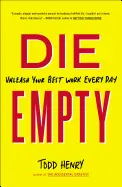
Die Empty - by Todd Henry
ISBN: 9781591846994Date read: 2018-12-01
How strongly I recommend it: 6/10
(See my list of 430+ books, for more.)
Go to the Amazon page for details and reviews.
Motivating thoughts on doing your work. Your work is the expression of your priorities. “Work” = creating value where it didn't previously exist. An interesting definition of three kinds of work: mapping, making, and meshing.
my notes
Instill consistent practices into your life that keep you on a true and steady course.
The most valuable land in the world is the graveyard. In the graveyard are buried all of the unwritten novels, never-launched businesses, unreconciled relationships, and all of the other things that people thought, ‘I’ll get around to that tomorrow.’ One day, however, their tomorrows ran out.”
Die Empty: If I don’t wake up tomorrow, I have emptied myself of whatever creativity is lingering inside.
When you’re gone, your work will stand as the single biggest testament to who you were - the sum total of where you choose to place your limited focus, assets, time, and energy.
Your work is the most visible expression of your priorities.
Define work as any effort to create value where it didn’t previously exist.
Many people do regret not having treated their life with more purpose.
Approach work with the kind of intention and conviction that imminent death makes palpable.
The more you apply self-knowledge to how you engage your labor, the more satisfaction you will find in the very act of work.
We live with the stubborn illusion that we will always have tomorrow to do today’s work. It’s a lie. We need to live with a sense of urgency.
Purpose paralysis = fear of getting it wrong.
Frustration when the daily grind of work doesn’t seem to reward your pursuit of those flashes of inspiration.
Can I lay my head down tonight satisfied with the work I did today?
Three Kinds of Work: Mapping, Making, and Meshing.
Mapping is planning, plotting your objectives, and setting priorities. It helps you ensure you’re spending your focus, time, and energy in the right places.
Making is actually doing the work - executing tasks.
Meshing is activities that stretch and grow you, such as acquiring and developing new skills, reinforcing or enhancing your knowledge, cultivating your curiosity, or generating a better understanding of the context for your work. It’s also composed of critical disciplines such as paying attention to the adjacent spaces in your industry and engaging in activities that may not have an immediate payoff, but position you to be more effective in the coming days.
Mapping + Making + Meshing = Developer
Mapping + Making − Meshing = Driver: Narrowly effective and is often unable to spot or take advantage of opportunities if they are outside his immediate area of focus.
Making + Meshing − Mapping = Drifter: a poor planner (Mapping). As a result, he frequently bounces from project to project and goes wherever his latest whim carries him. He has a good work ethic and may even be quite successful in short bursts, but his lack of strategic Mapping means that there is a lot of wasted opportunity and little strategic progress. He lacks the conviction of a long-term plan. Because of his failure to map effectively, the Drifter fails to follow through on many of his ideas and projects. He gets stuck and doesn’t see things through to the end.
Meshing + Mapping − Making = Dreamer: a talker, but he rarely accomplishes much because he’s always moving on to the next great thing.
You must adopt a Developer mind-set, meaning that you are disciplined about Mapping, Making, and Meshing so that you leverage all the opportunities and resources at your disposal.
The love of comfort - when comfort becomes the goal - is frequently the enemy of greatness in life and work.
When life doesn’t go the way you expect, it doesn’t necessarily mean that life has gone wrong. The secret is finding the balance between going out to get what you want and being open to the thing that actually winds up coming your way.
Flush with obligations and pressures, we neglect our relationships. You go into isolation mode and just keep your head down, cranking away at your work.
But when you isolate yourself you cut yourself off from opportunities to grow
Scan for relational outages, and remedy them before they become destructive.
What’s truly important to you? What battle would you be willing to fight anytime for any reason?
Follow your passion frames the conversation as if you are the center of the world, or as if a state of joy, bliss, or fulfillment is the objective of life.
Then you spend your life chasing after the next buzz when things get dull.
“Follow your passion” : we equate it to following our whims.
The most fulfilled people ask “What can I add?” rather than “What can I get?”
“Passion” has its roots in the Latin word pati, which means “to suffer or endure.”
Instead of asking “What would bring me enjoyment?” ask “What work am I willing to suffer for today?”
Suffering for something beyond yourself.
Spend yourself.
Productive passion is the sort that motivates you and is also beneficial to others.
Others-focused, not self-focused.
Compassionate anger: “compassion” means to “suffer with” - a desire to step in on behalf of those who are suffering, to rectify a wrong.
Your “open loops” - unfinished projects : afraid to say no to, but deep down you know that you can’t commit.
These must be either acted upon and made a priority, or immediately closed and put aside.
If you have too many open loops in your life, it diminishes your ability to focus on the mission-critical things.
You must become good at pruning your projects and commitments so that you have energy available for your most important work.